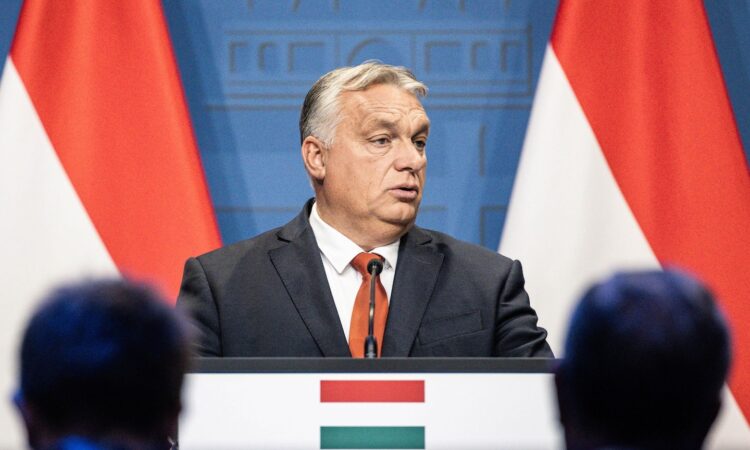
1. What’s the issue with Hungary?
Since returning to power in 2010, Prime Minister Viktor Orban has created what he’s described as an “illiberal” state in which there is little effective oversight of his rule. He’s appointed loyalists to the courts, the chief prosecutor’s office and the media authority; a big parliamentary majority allowed him to single-handedly write a new constitution; and he’s sought to limit the rights of some minorities, including LGBTQ communities. The European Parliament has passed a resolution stating that it no longer considers Hungary a full-fledged democracy. Transparency International, a not-for-profit graft watchdog, rates Hungary as among the most-corrupt of the 27 EU countries.
Poland’s de facto leader, Jaroslaw Kaczynski, has held up Orban as an example as he’s overhauled the nation since 2015. The ruling Law & Justice Party, which Kaczynski heads, is criticized for exercising political influence over the media and judiciary and in particular for a regime of disciplining judges. In 2021, the country’s top court challenged the EU’s legal foundation when it ruled that Poland’s constitution overrides some of the bloc’s laws.
3. Why did initial EU responses fall short?
While countries must adopt stringent democratic criteria to join the world’s largest trading bloc, there are few tools available to deal with errant members once they’re in. When the EU tried to act against Hungary in the past, Orban found a way out — dragging his feet on demands for change, cutting deals that fell short of meaningfully curbing his power, and exploiting shortcomings in the bloc’s charters. The EU’s Article 7 procedure can ultimately lead to the suspension of voting rights for a member that has violated common values. But because its use requires unanimity, pledges by Hungary and Poland to veto such a motion against the other have rendered the article useless.
Criticized by rights advocates and lawmakers in the European Parliament, among others, for bankrolling renegade members while failing to stop their slide away from democracy, the EU has decided to withhold funding — or threaten to do so — in an effort to elicit change. Member states have joined together to do this using a so-called conditionality mechanism, which took effect in 2022 and allows the bloc to freeze funding when it sees its money at risk, including due to suspected graft. The EU used the tool for the first time against Hungary after Orban’s fourth consecutive election victory in April 2022. The European Commission, the EU’s executive arm, has also frozen funding for alleged violations of the bloc’s Charter of Fundamental Rights, which covers judicial independence and non-discrimination.
5. How much money is at stake for Hungary and Poland?
On Dec. 22, the European Commission effectively froze almost €22 billion of Hungary’s 2021-27 cohesion funding, money set aside for poorer members to promote sustainable development. The reason: Hungary’s failure to comply with the Charter of Fundamental Rights, in particular in the protection of academic freedom, refugees and LGBTQ people. Two weeks earlier, EU member states suspended €6.3 billion in funding because of lingering corruption concerns. The EU also blocked €5.8 billion in grants from Hungary’s Covid recovery fund, pending changes to improve judicial independence in the country. For its part, Poland has seen no money yet from its €35.4 billion Covid recovery program, which includes grants and loans, nor from €75 billion in cohesion funds, which may be held up until the country complies with the EU charter. In addition, Poland is incurring a daily fine of €1 million a day for flouting an EU court order to dissolve a disciplinary chamber for judges, a sum that has grown to more than €400 million. Poland filed a complaint in December aimed at stopping the fines.
6. How important is the money to the two governments?
Very. Like many countries in Europe, both are dealing with cost-of-living crises, with inflation aggravated by the fallout from Russia’s war on Ukraine. Orban already emptied state coffers in early 2022 as he campaigned for re-election. With most EU funds blocked, he’s had to impose sweeping windfall taxes to plug budget holes. Kaczynski’s ruling party needs continued EU funding to maintain generous welfare spending ahead of elections expected in October, with polls showing it may lose power to the opposition.
7. Is the punishment having the desired effect?
Both countries have moved tentatively to try to reconcile their differences with the EU in the hopes of freeing up the cash flow. After almost a third of Polish municipalities declared themselves “free of LGBTQ ideology,” most revoked the resolutions following EU threats to suspend aid payments to local governments over the matter. Poland’s government also moved to reverse some of the most contested elements of its court overhaul. Yet legislation to that effect has been stalled in a dispute among the parties in the governing coalition. In Hungary, the government has passed more than a dozen pieces of anti-corruption legislation and has pledged to meet EU demands on judicial independence by the end of March. At the same time, Orban has downplayed EU concerns about democracy, casting doubt on his commitment to fundamental change.
–With assistance from Piotr Skolimowski and Stephanie Bodoni.
More stories like this are available on bloomberg.com






